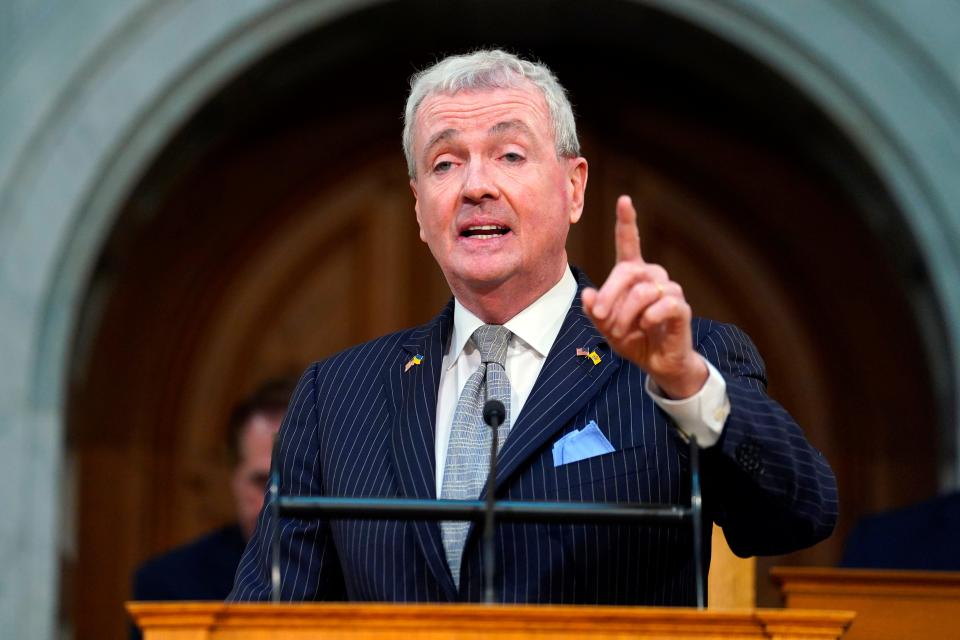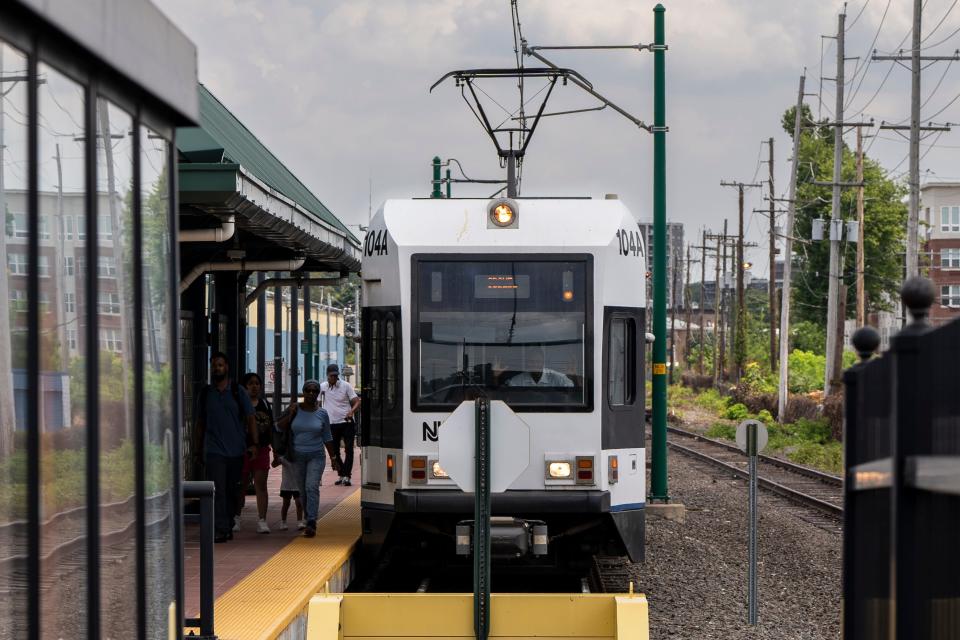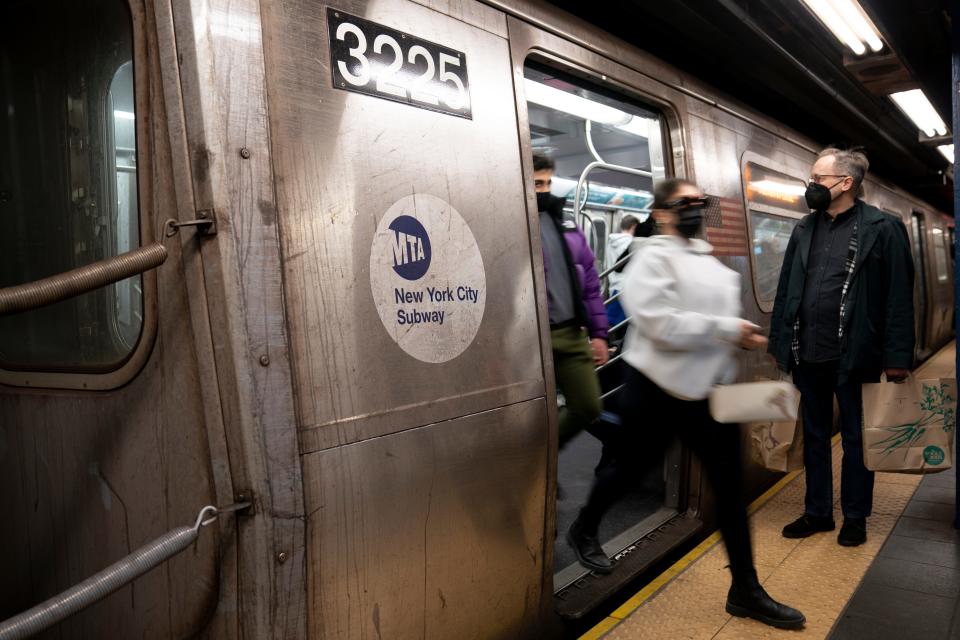NJ pols promised to let business tax expire. But could it be a lifeline for NJ Transit?
Could an expiring business tax suddenly become a revenue source for financially strapped NJ Transit?
A bigger push is being made to keep New Jersey's corporate business tax surcharge from expiring this year after a new report published this week advocated to keep the surcharge.
The report, authored by the nonpartisan think tank New Jersey Policy Perspective, lays out in nine pages the case for the state to continue collecting a surcharge on businesses that make a profit of over $1 million — and to dedicate that revenue to NJ Transit.
The agency — the largest statewide public transportation agency in the country — is predicted to have back-to-back deficits this fiscal year and next, making it the worst financial crisis in NJ Transit’s 44-year history. The agency has no constitutionally dedicated funds for its operating budget.
Story continues after photo gallery.
During the next fiscal year, from July 1, 2024, to June 30, 2025, NJ Transit is predicting a $119 million shortfall; the year after that it is forecast to balloon to $917.8 million. That’s about a third of the agency’s budget in fiscal year 2026.
To close the gap, everything is on the table, officials have said, including fare increases, corporate cost reductions, layoffs and service “realignments” — which often translate to service cuts.
Given the size of the budget deficit the agency faces in 2026 — nearly $1 billion — those measures would need to be so drastic they could cause a “transit death spiral,” transit experts have said, meaning that the service cuts and fare hikes would drive riders away in droves.
“Instead of relying on service cuts and fare hikes, state lawmakers should consider an alternative: have the largest and most profitable corporations help fund NJ Transit, a public service they directly benefit from,” the recent New Jersey Policy Perspective report said.
The surcharge, which the report said affects the top 2% of businesses in the state, including Amazon and Walmart, was added in 2018 after corporate tax cuts announced by former President Donald Trump. It was supposed to end in 2021 but was extended until Dec. 31, 2023, due to anticipated revenue losses from the COVID pandemic.
Political promises that are at odds
Gov. Phil Murphy said earlier this year that the tax was always supposed to be temporary and that he’s “on the side of a ‘deal is a deal.’”
Alex Ambrose, a policy analyst at New Jersey Policy Perspective and a co-author of the report, countered that the governor "has said he is committed to letting the CBT surcharge expire, stating that a promise is a promise, but he also made a promise to fix NJ Transit."

So far, neither the Legislature nor the governor has publicly discussed solutions to address NJ Transit’s impending budget shortfalls.
'Hard to claw them back'
Peter Chen, a senior policy analyst at New Jersey Policy Perspective, said convincing Trenton leaders to keep the business tax after they committed to letting it expire is an issue the group has been advocating for months and he hopes the report will give it a fresh push.
“We’ve seen previously, once tax cuts go through it’s very hard to claw them back, so we are really hoping that the crisis in NJ Transit along with the expiration of this revenue will help move that political conversation forward,” said Chen, who is a co-author of the report.

“This is a fair source of revenue that, rather than taxing already overburdened communities and transit riders, instead taxes the people who can pay it the most — corporate shareholders and executives,” he said.
New York has, NJ Transit has not
The driving reason behind the calls for the corporate business tax revenue to go to NJ Transit is that the agency lacks any tax revenue, fees or surcharges that are constitutionally dedicated to its operating budget — unlike other transit agencies of its size.
In New York, for example, there are about nine dedicated sources of money just for the Metropolitan Transportation Authority’s operating budget, including payroll taxes, a mortgage recording fee, a petroleum tax and for-hire vehicle surcharges. Some have been added or increased over the years as the agency has faced difficult economic challenges because of the COVID pandemic and the Great Recession of 2007-09.
New York's congestion pricing program — which led the Murphy administration to sue the federal government but which is expected to roll out next year — was also authorized by the New York Legislature as a way, in part, to dedicate toll revenue for the MTA's capital program.

By comparison, NJ Transit’s operating budget — and the state aid sent to help subsidize its spending plan — is decided on an annual basis by the governor and Legislature, a process that hampers the agency’s ability to plan for large capital projects or expansion efforts.
In stark contrast to New York, state aid for NJ Transit comes from the general fund, Clean Energy Fund and Turnpike Authority. A portion of the operating budget also comes from the agency’s capital fund. In fiscal year 2022, $432.2 million came out of the capital fund, up from the $362 million that was originally budgeted.
Absent dedicated aid, transit systems become more reliant on fare revenue, which makes public transportation less affordable and a less attractive option, said Rachael Fauss, a senior policy adviser at the nonprofit government watchdog group Reinvent Albany.
“The pressure of having fare revenues be such a large amount of the budget for any transit agency is just not sustainable, and particularly in the post-COVID climate,” Fauss said. “It’s safe to say increasing taxes is a political lift, but the alternative is running your transit system into the ground.”
Would dedicating the business tax go far enough?
Dedicating a portion of the business tax to NJ Transit was an idea first pushed by former Senate Majority Leader Loretta Weinberg and former Senate President Steve Sweeney in February 2020. But the effort dissolved once COVID hit the region a month later, and within two years both senior leaders were out of office.

Jersey City Mayor Steve Fulop announced earlier this year that he is running for governor in the 2025 election and made the CBT extension for NJ Transit a centerpiece of his transportation platform.
The efforts pushed by New Jersey Policy Perspective and Fulop would statutorily dedicate the CBT dollars to NJ Transit through a change in law.
Some, however, have criticized the idea for not going far enough to secure the money for NJ Transit because a statutory change is still subject to the annual — and political — budget process.
“The real question becomes what’s to enforce that funding being evergreen, being there every single year — and the only mechanism is the constitution,” said John Wisniewski, a lawyer and former Assembly transportation chair.
In New York, more than half of the taxes and fees that go to the MTA’s operating budget are truly dedicated, meaning they go directly to the agency and aren’t subject to budget negotiations each year, Fauss said. New Jersey’s Transportation Trust Fund, which is funded from gas and petroleum taxes and supports transportation projects, including NJ Transit’s capital program, is constitutionally dedicated.
However, the process of constitutionally dedicating money in New Jersey is not simple, though it doesn’t require the governor’s signature. To change New Jersey’s constitution in one year, it requires three-fifths of both houses of the Legislature to approve the measure, typically before August and September, to get the proposed change onto the fall election ballot. The other option is to win a simple majority in two consecutive years — 41 or more votes in the Assembly and 21 or more in the Senate.
Weinberg, who was on a conference call in support of the New Jersey Policy Perspective report, urged New Jerseyans to make this a top issue at the ballot box.
“If we don’t keep a viable NJ Transit, an agency that can plan for its day-to-day operations as well as its future, if we don’t find a way to solve that problem, we will be undermining a large portion of the growth of the economy in New Jersey,” she said. “I would urge voters out there, residents, advocates who are interested in this, to find out from the candidates in their own district how they feel about getting a reliable, dependable source of funding for NJ Transit.”
This article originally appeared on NorthJersey.com: NJ Transit: Could expiring NJ business tax be lifeline?

